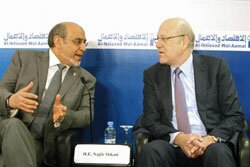
There were few Gulf residents seen around Beirut Sunday after Qatar, the United Arab Emirates and Bahrain issued travel warnings for their citizens in Lebanon. Prime Minster Najib Mikati called on officials in the three countries over the weekend to reconsider their decision.
“[There] are no justifications for them [travel warnings] because the security situation in Lebanon is good and the events [in Tripoli] have been resolved,” said Mikati, expressing surprise at the move.
He urged the three states to reconsider their decisions and welcomed “all those visiting Lebanon, particularly Arabs.”
Mikati made his remarks one day before the situation in north Lebanon got significantly tense again after soldiers shot dead a prominent anti-Syrian-regime preacher and his companion at a Lebanese Army checkpoint in the northern district of Akkar.
The UAE, Qatar and Bahrain called on their citizens Saturday to avoid travel to Lebanon and for those in the country to depart given the tense security situation, including clashes last week in the north of the country that have left 11 dead and dozens wounded.
The countries’ Foreign ministries urged those who intended to stay to notify officials of their whereabouts.
Mikati assigned Foreign Affairs Minister Adnan Mansour, who is currently in Doha to take part in a conference, to hold talks with officials in Qatar on the matter.
“We hope our responsible brothers in Qatar and the UAE will reconsider these two decisions because the situation in Lebanon does not require officials in these sisterly countries to take decisions such as this because the Qatari and Emirati brothers are as our other Arab brothers and they have a special place in the hearts of Lebanese,” Mansour said over the weekend.
In a meeting with Qatari Prime Minister Sheikh Hamad bin Jassem al-Thani, Mansour expressed his government’s position on the matter and also said he hoped “Qatar would reconsider its decision and avoid anything that could damage the strength of the relations between the two countries.”
The three Gulf countries stated clearly in official statements that they intended to pull their citizens from Lebanon until the security situation in the country was stabilized. “The UAE Foreign Ministry has urged citizens not to travel to Lebanon until the tense security situation there is cleared,” the ministry said in a statement in English.
Senior Foreign Ministry official Isa Abdullah Masoud al-Kalbani said the steps the UAE had taken were due to its “keenness for the safety of its expats and citizens.”
Kalbani called on those presently in the country to depart and urged those who must stay to call their embassy in Beirut to notify it of their whereabouts and supply contact details.
The UAE official also said it was important that citizens register on the ministry’s online Tawajudi program when leaving the Emirates.
Qatar issued a similar warning due to the “unstable security situation” in Lebanon, Qatari News Agency reported over the weekend.
The decisions came days after General Security arrested a number of people on charges of belonging to a terrorist network with links to Al-Qaeda. Qatari national Abdul-Aziz Atiyeh was one of the men arrested along with Lebanese Islamist Shadi Mawlawi.
While Mawlawi was still being questioned by the military court’s investigators, Atiyeh was released and the travel ban on him was lifted. Atiyeh left Beirut last week.
Bahrain asked its citizens not to travel to Lebanon to ensure their “security and safety” as it urged those already there to “immediately leave or stay away from insecure areas,” reported the Bahraini News Agency.
Unrest between the rival neighborhoods of Bab al-Tabbaneh and Jabal Mohsen in Tripoli that began last week claimed the lives of 11 people and left more than a hundred injured. The incidents stirred fears that violence in Syria could spill into Lebanon. The Lebanese Army, which was deployed to the area last week, brought an end to major clashes.
Commenting on the measures taken by the Gulf countries, Interior Minister Marwan Charbel said they had been “protective measures taken on the eve of the summer season.”
For his part, Maronite Patriarch Beshara Rai said Sunday he regretted the decisions made by Bahrain, the UAE and Qatar, arguing that they could hurt the Lebanese.
“I am saddened by this decision because Lebanon is a country of peace and good ... such a decision hurts us and does more harm than good,” added Rai, speaking at Saint Louis University in the U.S. state of Missouri. The patriarch is currently on a pastoral visit to the United States, Mexico and Canada
Meanwhile, outdoor hangouts for Gulf visitors around Downtown Beirut, Zaitunay Bay, Beirut Souks, Hamra and Ashrafieh were missing some of their regular clientele.
There were many reports of people from those Gulf countries receiving direct notification telling them to leave the country.
“Yesterday [Saturday], a group of Emirati citizens were sitting and having dinner and received text messages on their phones telling them they should leave the country as soon as possible,” said Ali Abdul-Wahed, manager of Karamna restaurant in Downtown Beirut.
Abdul-Wahed added that he expected the advisory to have a serious impact on his restaurant and the tourist season.
Fadi, an employee at a valet parking company, noted an unusually smaller number of Gulf tourists in the area near his Downtown workplace. “It was obvious since yesterday [Saturday] afternoon that most of them are planning to leave the country soon,” he said.
If their absence is a sign of things to come it spells a serious loss for the country’s economy, which draws large amounts of capital from the yearly tourism season and Gulf spending. Gulf investment in housing and business is another source of cash inflows for the country.
The UAE-based newspaper Gulf News reported that many Gulf residents were already considering changing their travel plans.
“In Doha, travel agents said the call by the Qatari Foreign Ministry to avoid Lebanon would result in the cancellation of their bookings,” the newspaper wrote Sunday.
The U.S. recently renewed its long-standing travel warning to the country, citing the growing instability from the Syrian conflict, among other reasons.
Gulf residents who have decided to stay say they feel safe in Beirut and nearby cities. They add that the instability remains distant for now.
“I’m not afraid. I believe that Beirut and Jounieh are two safe cities,” said Fahed, a 34-year-old Saudi who is planning to stay in Lebanon for three weeks.













